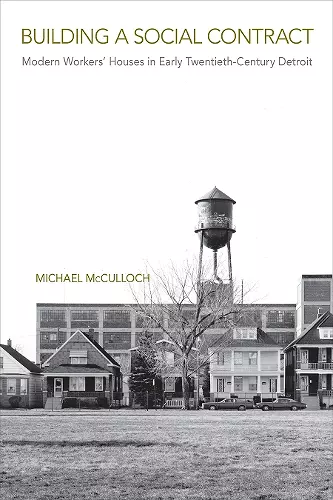Building a Social Contract
Modern Workers' Houses in Early-Twentieth Century Detroit
Format:Hardback
Publisher:Temple University Press,U.S.
Published:31st Oct '23
£88.00
Supplier delay - available to order, but may take longer than usual.

The dream of the modern worker’s house emerged in early twentieth-century America as wage earners gained access to new, larger, and better-equipped dwellings. Building a Social Contract is a cogent history of the houses those workers dreamed of and labored for. Michael McCulloch chronicles the efforts of employers, government agencies, and the building industry who, along with workers themselves, produced an unprecedented boom in housing construction that peaked in the mid-1920s.
Through oral histories, letters, photographs, and period fiction, McCulloch traces wage earners’ agency in negotiating a new implicit social contract, one that rewarded hard work with upward mobility in modern houses. This promise reflected workers’ increased bargaining power but, at the same time, left them increasingly vulnerable to layoffs.
Building a Social Contract focuses on Detroit, the quintessential city of the era, where migrant workers came and were Americanized, and real estate agents and the speculative housebuilding industry thrived. The Motor City epitomized the struggle of Black workers in this period, who sought better lives through industrial labor but struggled to translate their wages into housing security amid racist segregation and violence. When Depression-era unemployment created an eviction crisis, the social contract unraveled, and workers rose up-at the polls and in the streets-to create a labor movement that reshaped American capitalism for decades.
Today, the lessons McCulloch provides from early twentieth-century Detroit are a necessary reminder that wages are not enough, and only working-class political power can secure affordable housing.
"By examining the social contract and workers’ housing, McCulloch reveals how the understudied period of Detroit’s rapid growth in the 1910s and 1920s shaped both home and work in the United States. Through this overarching argument, Building a Social Contract makes three key contributions.... By grounding his research in a way that marries the theoretical with the tangible and familiar, McCulloch set an accessible tone while tackling hefty ideals. His theoretical and comparative discussions read like a conversation."-The Journal of Planning History"McCulloch has made a significant contribution to the historiography of early twentieth century Detroit, and more broadly to our understanding of the housing boom of the 1910s and 1920s and how it was shaped by intersecting economic, social, and cultural influences."-History: Reviews of New Books“In his insightful new study, Building a Social Contract, Michael McCulloch takes us into the bungalows, cottages, and two-flats of working-class Detroit at the height of America’s industrial age. Through those utterly ordinary places he builds a powerful analysis of the pride, hope, hatred, and fear that shaped the blue-collar version of the American Dream.”-Kevin Boyle, William Smith Mason Professor of American History at Northwestern University, and author of Arc of Justice: A Saga of Race, Civil Rights, and Murder in the Jazz Age“Michael McCulloch tells one of the unheralded stories of urban America in the twentieth century: the emergence of modern homes for workers in the 1920s. The homes were modern in style, boasting indoor bathrooms and electric lighting. Using evocative photographs, he shows as well as tells, helping us to understand Detroit, then the epicenter of modern industry; the people; the plans; the builders; and best of all the meaning that these homes had for their first occupants. A pleasure from beginning to end.”-Richard Harris, Professor Emeritus at McMaster University, and author of How Cities Matter"[A]n interesting book about suburban sprawl, 1920s style.... [T]he argument is well supported by an excellent set of informative maps and contemporary photographs.... [McCulloch] has assembled these pieces creatively and insightfully to tell an important story about an important city."-Journal of American History
ISBN: 9781439923917
Dimensions: unknown
Weight: unknown
240 pages